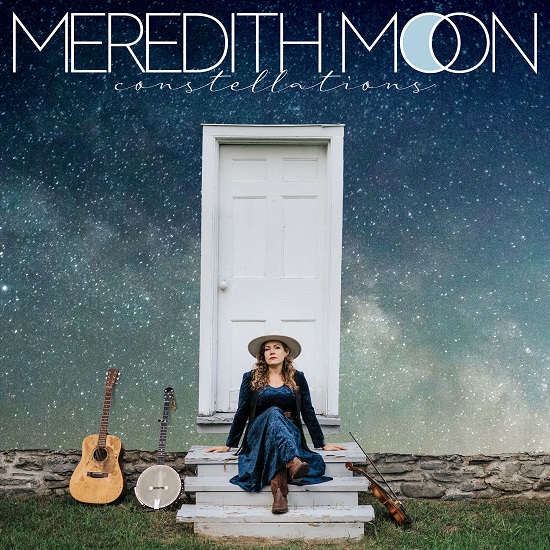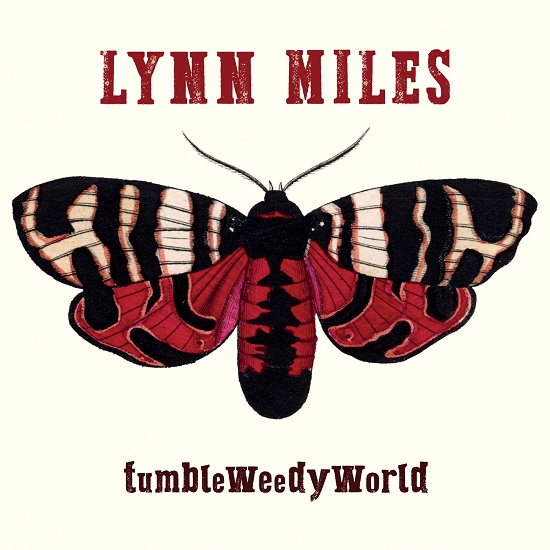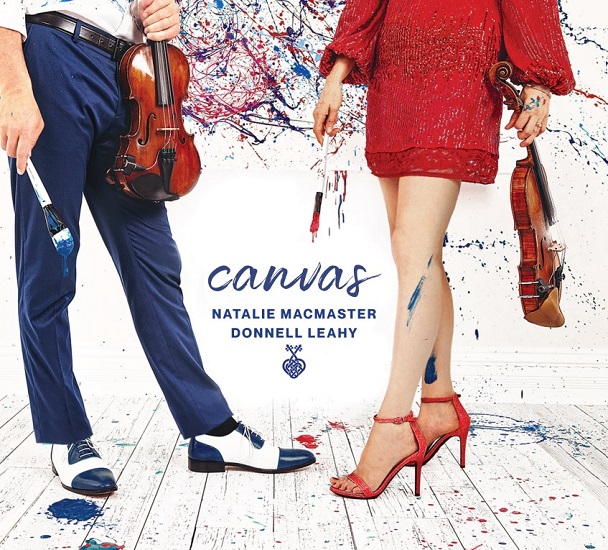
Where do we start with this one? It’s not quite a first album, it’s the first album that isn’t self-released and it’s a journey by road, by rail and by water taking us from the point where Meredith learned to play clawhammer banjo from YouTube videos to playing support gigs with a Canadian folk legend last year; this odyssey hasn’t been a straightforward one. She set off with her banjo, hitchhiking between venues with a folk-punk band and booking gigs using traditional music and punk networks across the Americas and Europe. It was an interesting way of honing her craft while providing material for some of the songs featured on ‘Constellations’.
As a self-taught player of traditional Appalachian music, you would expect to hear some traditional influences on the album and you wouldn’t be disappointed. There’s a banjo instrumental ‘Needlecase Medley’ (accompanied by podorhythmie – you can google that one) and the traditional ballad ‘Soldier’s Joy’. Its incongruously uptempo jaunty feel emphasises the pathos of a soldier fighting off the pain of battlefield wounds with opiates and alcohol.
Of the eight originals, unsurprisingly, there’s an instrumental piece, ‘Brokenwing Bird’, which showcases Meredith’s banjo skills. It’s a tour de force with superb playing throughout, style and tempo changes including a rallentando ending to represent the bird fading away. Of the remaining songs, there’s a strong emphasis on travelling; ‘Constellations’ is a hitchhiker’s song about seeing the night sky with a lover, while ‘That Town’ references the town of Wawa in Northern Ontario where hitchhikers often get stranded. ‘Lighthouse County’ and ‘Mark Twain’ are both nautical songs, the latter referencing the pseudonym of Samuel Clements and its original nautical meaning. There are also references to the constellations throughout the song as well. And while we’re on the subject of literary references, ‘Starcrossed’ has a couple of Shakespearean references including the obvious ‘Romeo and Juliet’ one.
‘Constellations’ is a fascinating piece of work. Setting aside the banjo virtuosity, the arrangements are minimal, allowing the songs to impress without too much embellishment. Meredith’s voice is understated throughout and the songs are interlinked by various themes and styles, creating a sense of unity across the album. It took a few listens to get under the skin of this understated piece of work, but it was definitely worthwhile. And what about that Canadian folk legend I mentioned? Meredith has consciously avoided playing on the fact that she’s the daughter of Gordon Lightfoot, preferring to make it on her own merits but the time has come now to open up on that one.
‘Constellations’ is out now in Europe on True North Records (TND807).
Here’s the official video for the song ‘Constellations’:

The Bluest Sky is the latest incarnation of Chuck Melchin, following his spell of four albums and two EPs as the cornerstone of celebrated Bean Pickers Union. The self-titled album is an attempt to move on from gentler introspective feel of his earlier work to creating “music that will make you want to drive your car faster”. With the nine songs featured here, he’s definitely succeeded; there’s only one slower, more contemplative, song on the album, but more about that later. The Laurel Canyon influence is strong on ‘The Bluest Sky’ with nods to Eagles, Neil Young and maybe even Evan Dando at times. The album was put together using the post-COVID method of musicians recording parts in their own studios before being mixed and mastered by Dave Westner; the results are organic and seamless.
The opening song, ‘Belly to the Bar’ sets the tone for the rest of the album with a country rock feel driven along by a pair of electric guitars under Melchin’s slightly fragile vocal as the story unfolds of a character trying to avoid being pulled into a rebound relationship. Most of the album’s songs are about personal situations although each has a slightly different twist. ‘The Girl It Took the Universe’ is a metaphysical look at the unseen forces moulding and pulling together two people over the aeons until the time is ripe for them to meet ending on a classic sixties sus4/sus2 progression, ‘Amy Jean’ is a straightforward karma and revenge song with a Southern rock feel that hints at the Allman Brothers’ Band’s ‘Jessica’ and ‘I Am James’ is a gentle country rock story of a man too shy to get himself noticed by a woman. ‘Drive Through Confessional’, with its mainly acoustic arrangement before a soaring electric guitar joins the mix, is a powerful piece of hometown nostalgia that turns around with the realisation that that reason for going back is the death of a loved one; it’s a powerful piece of work.
The two songs that step outside the personal may or may not be connected. The slow and melancholy ‘New Berlin’, its sadness punctuated by pedal steel fills, is a snapshot of a smalltown American town destroyed by a world economy that values only profit and scale; things can only get worse. There are a couple of references to classic American songwriters, John Fogerty’s ‘The Old Man Down the Road’ and Townes Van Zandt’s ‘Waiting Round to Die’ in the lyrics. It’s a powerful song with a storyline that could ultimately lead to the apocalyptic vision of ‘Bunkhouse’, the album’s penultimate song. The story of an unspecified rebellion and survival skills is played out over a Crazy Horse-style backing to maximum sinister effect.
Chuck Melchin and his collaborators have achieved the primary aim of making us want to drive faster while creating a bunch of varied and beautifully crafted songs. Job done.
‘The Bluest Sky’ is out now.
This is ‘Bunkhouse’:

So what’s ‘TumbleWeedyWorld’ about then? Basically it’s about ten songs crafted by a superb songwriter, with musical arrangements that enhance the songs without submerging them and delivered in a beautifully clear fluty voice by Lynn Miles. But I suspect you’re expecting about another three hundred words before I put this one to bed.
With a back catalogue of fifteen albums, a collection of over nine hundred songs, a host of awards and covers by many artists, Lynn has deservedly been a fixture on the Canadian circuit for many years. ‘TumbleWeedyWorld’ is exactly the kind of album you would expect from someone with that pedigree.
The songs are so good that the album doesn’t need a huge production to make them work. The backbone of the arrangements is a traditional string band line-up of upright bass, fiddle, guitar and dobro. Add the exquisite harmonies and you have everything you need for an album of high lonesome-tinged country. In line with the minimalism of the arrangements, the album doesn’t feature a lot of solos, it’s much more about creating interesting textures. There are plenty of instrumental fills from the various players, but the only real solos are the laid-back banjo and mandolin efforts on ‘Hide Your Heart’ and the guitar solo on the rousing, uptempo ‘All Bitter Never Sweet’ which is a nod in the direction of Johnny Cash and June Carter’s ‘Jackson’. That particular couple also make an appearance earlier on the album.
It’s an album of sad songs which somehow manages to end on an optimistic note in the love song ‘Gold in the Middle’ with its effortless vocal and stripped-back arrangement emphasising the purity of the message. The remaining nine songs, with the exception of the relatively positive ‘Palomino’, are explorations of the ways that relationships can fail or the ways we can be hurt. If you want a couple of examples of Lynn’s mastery as a wordsmith, there are two songs that are absolutely packed with poetic imagery.
The opener, ‘Night Owl’, starts from the same situation as Oliver J Leiber’s Paula Abdul song ‘Opposites Attract’ before grim reality kicks in with the realisation that this relationship would never work. The heart-breaking ‘Johnny Without June’ explores the reality of being the one left behind after a long relationship is ended by death. It’s delivered in almost a Nashville style and, just in case you didn’t get the song’s references, it’s all made clear by two references to Johnny Cash songs in the song’s final four lines.
‘TumbleWeedyWorld’ is a polished piece of work from a great songwriter. Lynn Miles has taken a cold, hard look at the things that can go wrong for us in a screwed-up world and expressed them in words and music. However, she leaves room for optimism (or dodging the tumbleweeds) with ‘Palomino’ and the closing song ‘Gold in the Middle’. If you’re a fan of country in any of its many forms, you should give this gem of an album a listen.
‘TumbleWeedyWorld’ is out now on True North Records (TND802).
Here’s the lyric video for ‘Johnny Without June’:

And still the pandemic albums keep coming; it took a while to adjust, but the adversity of 2020 and 2021 was a genuine mother of invention. The response of Natalie MacMaster and Donnell Leahy was to take the opportunity to go back to basics and start all over again with a tabula rasa, or a blank canvas, fusing their traditional musical roots with a huge variety of influences from across the globe and across the ages. All the way from Scotland in the nineteenth century to Spain and Latin America in the 2020s; that’s a broad and sometimes weird canvas.
The title track and exposition is a very short piece priming the canvas for the rest of the album. It’s a sketch that introduces atmospheric banjo and fiddle with some ethereal backing vocals and a bit of synth bass, hinting at some of the interesting combinations yet to come. And they are very interesting combinations.
Of the album’s thirteen pieces, two have lyrics (‘Woman of the House’ is sung by Rhiannon Giddens in Gaelic while ‘Wish You Were Near’ is sung by its author, Robyn Cunningham), three have backing vocals and the remaining eight are instrumentals ranging from the plaintive traditional James Scott Skinner tune ‘The Laird o’ Bemersyde’ to some absolutely bonkers (in the best possible way) fusions with other musical traditions. If you’re not admiring the quality of the musicianship, you’ll be smiling at the audacity of some of the fusion arrangements. The other James Scott Skinner to appear on the album, ‘The East Neuk of Fife’ begins its journey as a traditional fiddle piece before Natalie’s variations on the theme take over and the slap bass kicks in. That was definitely one of the smiley moments.
Here are some of my personal highlights. ‘So You Love’, featuring classical cellist Yo Yo Ma which starts with a solo piano, builds through a combination of Gaelic and Eastern European styles, string ensembles and a cello solo before speeding up into a huge string section with counterpoint fiddles and releasing the tension with a slow finish; it’s a symphony in miniature. ‘The Case of the Mysterious Squabbyquash’ is another kitchen sink production that gives a nod to the great Irish folk-rock fusion band, Horslips. The song opens with fairly traditional fiddle stylings and builds with rock bass and drums before a Hammond break leads into an outrageously over-the-top wah-wah guitar solo from the album’s producer Elmer Ferrer that sums up the album; you really don’t know what’s coming next. It could be step dancing, a horn section counterpoint fiddles.
‘Canvas’ is a truly remarkable piece of work. Just when you think Natalie and Donnell have exhausted the creative possibilities and they pull another trick out of the bag. You won’t get tired of listening to ‘Canvas’ any time soon and I think you’ll be grinning every time you listen to it.
‘Canvas’ is released in the UK on Friday April 7th.
Here’s the official video for ‘Colour Theory’ featuring Brian Finnegan:


